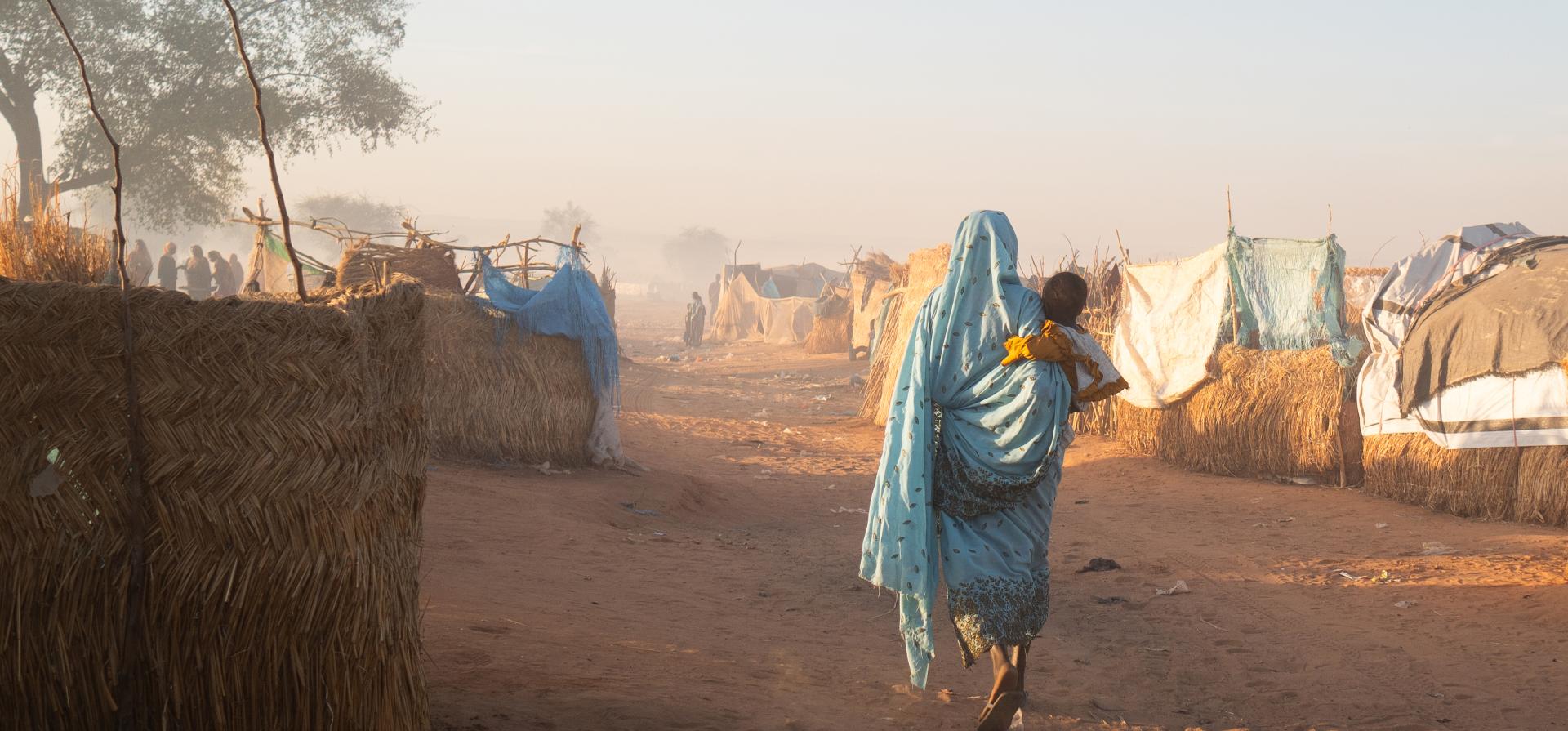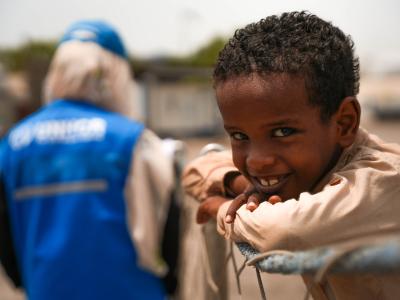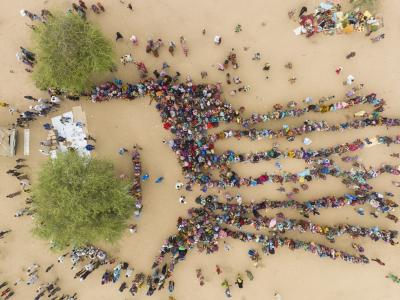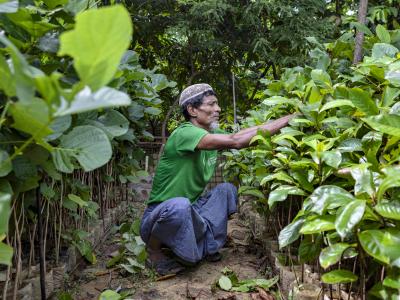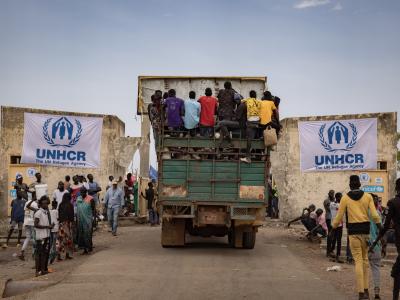Regional overview
In West and Central Africa, the number of forcibly displaced and stateless people increased to 11.8 million, up from 11.2 million in 2022.
The conflict in Sudan drove over 556,000 Sudanese refugees into Chad, the majority women and girls. By the end of 2023, Chad hosted 1.1 million Sudanese refugees, including those present before the latest crisis. In addition, over 28,200 people arrived in the Central African Republic (CAR), including refugee returnees.
Three-quarters of the region’s refugees originated from Sudan, the CAR and Nigeria, while Chad hosted almost half of all refugees in the region.
The security and humanitarian situation in the central Sahel continued to deteriorate, leading to refugee movements into Benin, Côte d'Ivoire, Ghana, and Togo. 88,300 arrived from Burkina Faso alone, while the number displaced within Burkina Faso surpassed 2 million. In response to the influx from Burkina Faso, UNHCR established two new offices in Côte d’Ivoire and one in Ghana to help the Governments and communities assist the new arrivals. There were also still almost 3.5 million IDPs in Nigeria, an increase of more than 10% from 2022, and 1.1 million in Cameroon.
UNHCR reacted to the Sudan crisis with an emergency response in Chad that provided emergency, life-saving assistance and supported the relocation of 248,000 individuals arriving at the border to existing and new camps a safe distance inside the country. 69,700 refugee children received psychosocial support in child-friendly spaces. Over 274,000 medical consultations were conducted, and 217,000 children were screened for malnutrition.
Across the region, UNHCR registered over 260,000 people biometrically and provided core relief items to 800,000 people, while 218,900 of the most vulnerable refugees and IDPs received cash assistance. A growing number of forcibly displaced people embarked on perilous journeys, with rising numbers from Burkina Faso, Mali, and Sudan arriving in Europe. Following a route-based approach to mixed movements, UNHCR engaged with governments and partners to strengthen the identification of people in need of international protection along the routes, and to communicate with them to ensure they can get help.
The inter-agency protection monitoring system, Project 21, already implemented in the central Sahel and Chad, was expanded in Côte d'Ivoire and Benin. More than 30 partners gathered data from 2,500 communities, conducting 25,000 interviews. Findings continue to guide programming and response.
Secondary and tertiary education enrolments for refugees in the region increased, yet primary school enrolment decreased by 8% due to deteriorating security and recent refugee influxes. UNHCR supported governments to enhance access to safe and quality education by constructing 230 classrooms; distributing 96,700 school kits; training more than 3,400 teachers and providing higher education scholarships for 1,150 refugee youth. Cash assistance for education benefited more than 47,100 students.
UNHCR sustained its advocacy for an improved protection environment for forcibly displaced and stateless individuals and provided technical support and capacity-building to governments. Côte d’Ivoire adopted its first national asylum law. São Tomé and Príncipe acceded to the two UN statelessness conventions. Chad domesticated the Kampala Convention, and Burkina Faso validated a draft law for its domestication. UNHCR supported the Economic Community of West African States and the Economic Community of Central African States in the drafting of the first regional model law on statelessness, which was adopted at the technical level.
UNHCR supported the voluntary repatriation of over 4,000 Central Africans, mainly from Cameroon and the Democratic Republic of the Congo. 4,100 refugees in the region were submitted for resettlement and 3,119 were resettled during the year.
The Central African Republic Solutions Support Platform was launched in line with the commitments of the Yaounde Declaration to resolve displacement created by the CAR crisis. Signatory governments are committed to improving access to rights, enhancing social services in areas of return and promoting employment. National action plans will be implemented with support from Member States and the members of the Core Group, chaired by the African Development Bank.
UNHCR further strengthened its collaboration with development actors. In Chad, the World Bank included livelihoods, energy, social protection, and institutional capacity-building as areas of investment to support host communities and refugees. UNHCR developed a regional strategy for climate action to ensure protection for the forcibly displaced in climate vulnerable settings. In collaboration with the Centre for International Forestry Research and the World Agroforestry Centre, reforestation began in Cameroon. Additionally, UNHCR fostered climate-smart agriculture in Burkina Faso and worked to recuperate degraded soil in Niger.
Regional expenditure and budget
$482 million spent against a budget of $1.065 billion
$583 million of unmet needs or 55% of the budget
Population overview
Financial overview
Trends in response
Multisectoral monitoring results
Protection

Child protection

Accountability to
affected populations

Basic needs


Shelter

Health



Nutrition

2.9 million people received protection services*
*Protection services encompasses a vast range of community-based, individual and household interventions in various domains of UNHCR protection work, including counselling and information on rights, sensitization on protection issues, community outreach and mobilization, specialized services for children or other persons with specific needs, GBV programming, legal assistance, registration and documentation, Refugee status determination and resettlement case-work, protection monitoring.
1.2 million children received protection services*
70% of countries in the region had child protection services available to forcibly displaced and stateless children
*Child protection services include support through Best Interests Procedures for children at risk, targeted support for children with specific needs and children in alternative care, support through family tracing and reunification, and reintegration support for children associated with armed groups and forces.
83% of reporting countries had a multi-channel feedback and response system that was designed based on consultations with forcibly displaced and stateless people
2022 result: 100%
133,300 people received cash assistance
2022 result: 221,100
749,000 people received non-food items including core relief items*
Indicator not available in 2022
*This indicator reflects the total number of people who benefited from the direct distribution of in-kind non-food items, including domestic Core Relief Items (CRIs) and excluding shelter CRIs.
448,000 people received shelter and housing assistance
Indicator not available in 2022
*Shelter and housing assistance includes emergency, transitional and durable shelter provision, collective shelter, shelter repair and maintenance, and rental programming.
1.3 million people received essential health care services
2022 result: 1.4 million
216,000 women and girls received sexual and reproductive health services*
2022 result: 154,600
*Sexual and reproductive health services include antenatal care, assisted delivery, postnatal care, family planning services and health services for survivors of gender-based violence.
47,000 people received mental health and psychosocial support services
2022 result: 30,700
59,300 children 6-59 months were admitted for treatment of moderate acute malnutrition (MAM)
2022 result: 25,500
30,000 children 6-59 months were admitted for treatment of severe acute malnutrition (SAM)
2022 result: 17,500

Private sector initiatives for African Displacement Solutions
Following the inaugural Africa Forum on Displacement held in Rwanda in 2021, UNHCR, the Amahoro Coalition and Inkomoko convened a second edition, with the support of Mastercard Foundation and IKEA Foundation. The “Africa Forum on Displacement – Private Sector Solutions” took place in November 2023 in Accra, Ghana, and brought together more than 700 participants from across Africa’s private sector, alongside refugees and representatives from governments, academia, and faith-based institutions.
With young refugees at the centre, the Forum highlighted the impact of previous pledges and paved the way for additional commitments, facilitating 22 new pledges in livelihoods, education, health, advocacy, fundraising, and connectivity. Such pledges are anticipated to impact the lives of thousands of forcibly displaced people across Africa by enhancing their well-being, ensuring their inclusion in national systems, and promoting access to information and self-reliance.
Situations
Central African Republic situation
Western and Central Mediterranean situation
Operations*
Burkina Faso | Cameroon Multi-Country Office | Central African Republic | Chad | Mali | Niger | Nigeria
*The operations listed above are the ones with annual results reports available on Global Focus for 2023.
